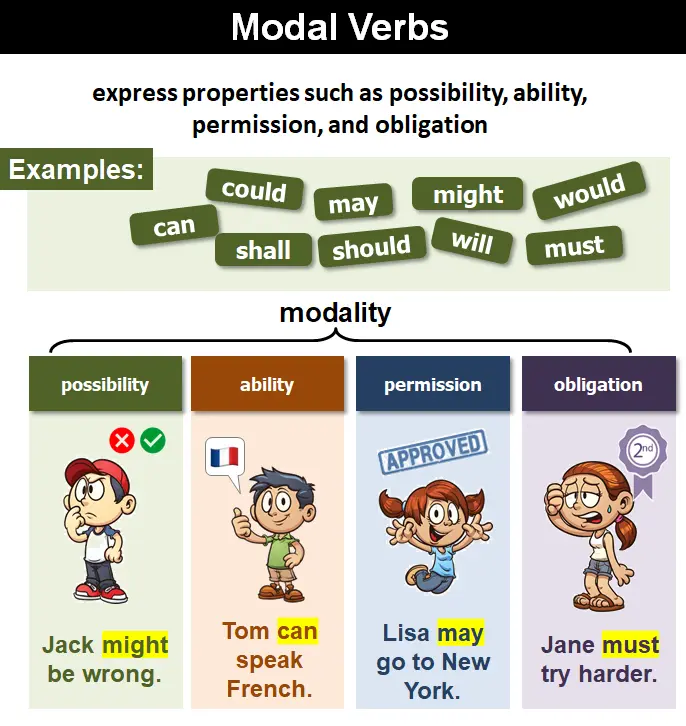The main modal verbs are “can,” “could,” “may,” “might,” “shall,” “should,” “will,” “would,” and “must.” Modal verbs refers to “modality”, which is possibility, ability, permission, obligation, and condition.

Present Modal Verbs
Subject + Modal Verb + Base Form of Main Verb + (complements/phrases)
Unlike a normal verb, a modal verb does not change. In other words, a modal verb does not conjugate, have participle forms, or have an infinitive form. For example:
play/plays playing/played [to play]
can X X
Modal Verbs Showing Possibility
“can,” “could,” “may,” or “might” + [base form]
Alan can play football against St. Joseph’s.
Alan could play against St. Joseph’s because he cancell[ed] his holiday.
(Note that “could” is the past-tense version of “can.”)
We use could because of the word cancelled. Its past tense so the possibility takes in past tense..hence ‘could’.
1. Must (Strong Possibility ≈ 95%)
Deduction based on evidence
“You’ve been studying all day. You must be tired.”
“She’s not answering her phone. She must be in a meeting.”
2. Should (Expected Possibility ≈ 75%)
Logical expectation
“The package should arrive tomorrow.”
“He left an hour ago, so he should be here soon.”
3. May (Medium Possibility ≈ 50%)
Formal, fairly likely
“I may go to the concert tonight.”
“The manager may approve your request.”
4. Might (Lower Possibility ≈ 30%)
Less certain than ‘may’
“It might rain later, but the sky looks clear.”
“We might visit Paris next year, if we save enough.”
5. Could (Weak Possibility ≈ 10-50%)
Theoretical possibility
“Anyone could win this game.”
“It could snow tomorrow, but it’s unlikely.”
Modal Verbs Showing Ability
The Main Modal Verbs for Ability:
1. Can (Present Ability – Most Common)
General present ability
“I can speak Spanish.”
“She can swim very well.”
“Cats can see in the dark.”
2. Could (Past Ability)
General past ability
“When I was young, I could run fast.”
“He could play piano when he was a child.”
“They could solve complex problems.”
Other Ways to Express Ability:
3. Be Able To (All Tenses – More Flexible)
Present: “I am able to help you tomorrow.”
Past: “I was able to finish the project.”
Future: “I will be able to drive next year.”
Perfect: “I have been able to save money.”
4. Managed To (Past Success After Effort)
“She managed to fix the computer.”
“They managed to arrive on time despite traffic.”
Key Differences:
Can vs. Be Able To:
Can = general, inherent ability
Be able to = specific instance or all tenses
Compare:
“I can swim.” (General ability)
“I was able to swim to shore yesterday.” (Specific past instance)
Could vs. Was Able To:
Could = general past ability
Was able to = specific successful action
Compare:
“I could swim when I was five.” (General ability)
“I was able to rescue the dog from the river.” (Specific success)
Quick Summary Table:
Modal Time Usage Example
Can Present General ability “I can cook.”
Could Past General ability “I could dance well.”
Modal Verbs Showing Permission
“can” or “may” + [base form]
You can swim in the lake.
(“Can” is also used to express permission.)
You may swim in the lake.
(“May” is more polite than “can” when expressing permission.)
Modal Verbs Showing Obligation
“shall,” “should,” or “must” + [base form]
We shall defend our island, whatever the cost may be.
(Shall means “expressing a strong assertion”, so “We have no option but to defend our island.”)
The aim of argument should be progress not victory.
(This means “It is right if the aim of argument is progress.”)
You must do the things you think you cannot do.
(This means “It is right to do the things you think you cannot do.”)
Modal Verbs Showing Condition
“would” + [base form]
The word “happy” would lose its meaning if it were not balanced by sadness. correct tick (Swiss psychiatrist Carl Jung)
(Sadness is needed for “happy” to exist. It is a condition.)
Past modal verbs
Subject + modal verb + have + past participle + (complements/phrases)
The format below is another common way of using modal verbs:
[modal verb] + “have” + [past participle]
This structure is typically used for expressing modality (e.g., possibility, ability, permission, obligation, and condition) in the past tense.